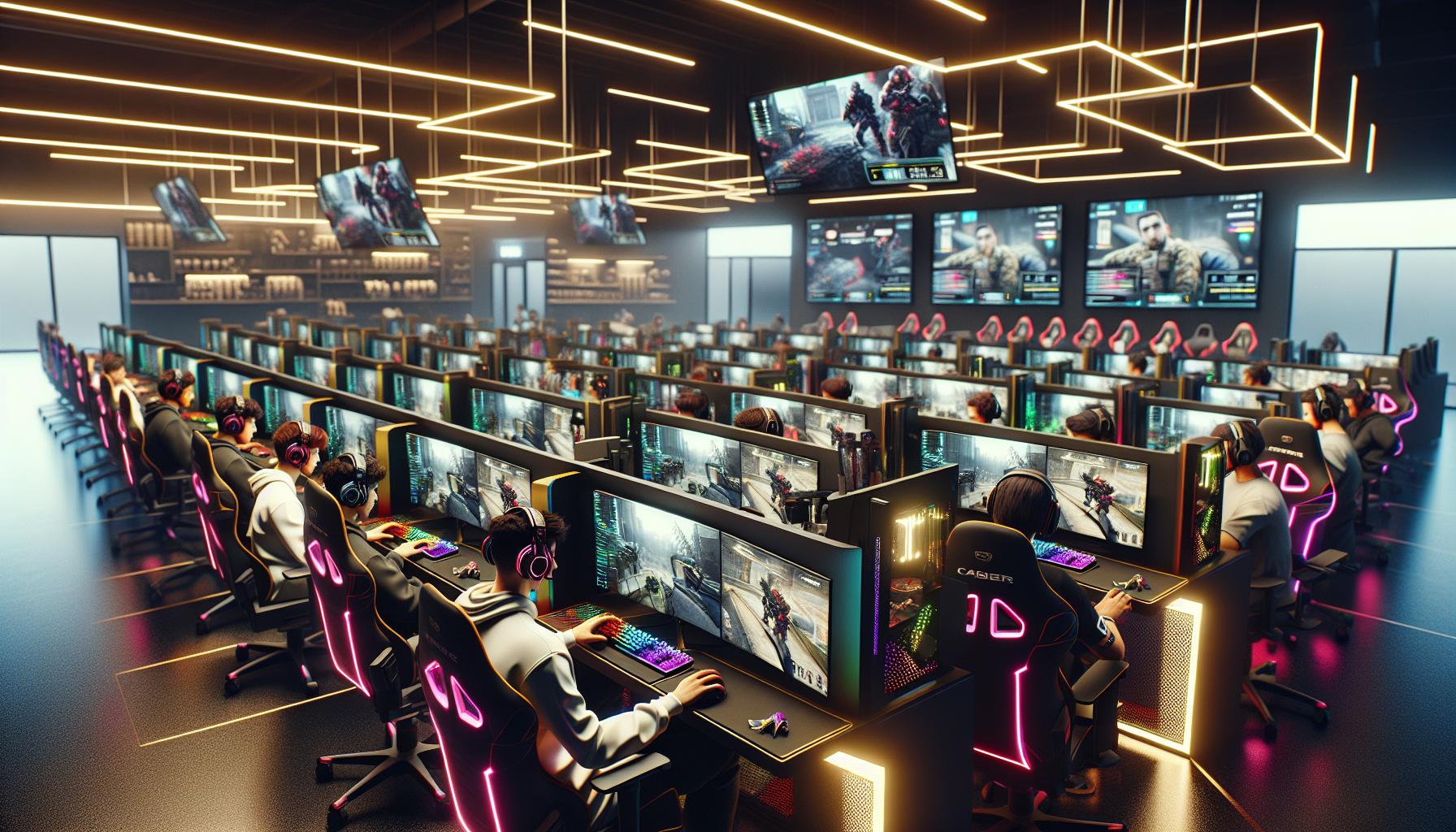 As the world of competitive gaming continues to soar in popularity, esports academies are emerging as vital training grounds for aspiring players. These institutions provide structured environments where individuals can hone their skills, learn game strategies, and develop teamwork essential for success in the fast-paced realm of esports.
As the world of competitive gaming continues to soar in popularity, esports academies are emerging as vital training grounds for aspiring players. These institutions provide structured environments where individuals can hone their skills, learn game strategies, and develop teamwork essential for success in the fast-paced realm of esports.
With a blend of coaching, mentorship, and advanced technology, esports academies offer a unique opportunity for gamers to elevate their performance. They not only focus on gameplay but also emphasize mental resilience and physical well-being, preparing students for the challenges of professional competition. In this article, we’ll explore the significance of esports academies and how they shape the future of competitive gaming.
Key Takeaways
- Purpose of Esports Academies: These institutions are designed to train gamers by enhancing skills, teamwork, and mental resilience necessary for competitive play.
- Structured Skill Development: Players receive targeted coaching in gameplay mechanics, strategy formation, and decision-making to improve their overall gaming performance.
- Networking Opportunities: Esports academies facilitate connections between players and industry professionals, paving the way for mentorship and potential sponsorships.
- Comprehensive Curriculum: Training programs include game-specific drills, stress management workshops, and physical conditioning to ensure holistic development for aspiring esports athletes.
- Financial and Time Considerations: Attending an esports academy involves significant financial investment and time commitment, which potential students should carefully evaluate before enrollment.
Esports Academy
Esports academies serve as pivotal environments for training dedicated gamers. They focus on building skills, enhancing teamwork, and promoting overall well-being through structured programs.
Definition of Esports Academy
Esports academies are specialized institutions designed to train individuals in competitive gaming. These academies often include facilities for in-person training, access to experienced coaches, and programs tailored to various game genres. They aim to foster both individual and team skills among participants, preparing them for the demands of professional esports competition.
Purpose and Goals
Esports academies aim to develop well-rounded players equipped for competitive scenarios. Key purposes include:
- Skill Development: Players enhance gameplay mechanics, strategic understanding, and decision-making abilities.
- Coaching and Mentorship: Experienced coaches provide tailored guidance, helping players refine their skills and strategies.
- Teamwork Enhancement: Participants collaborate in teams, learning communication and synergy essential for success in competitive matches.
- Mental Resilience: Programs often include training focused on managing stress and maintaining concentration during high-stakes gameplay.
- Physical Health: Academies emphasize the importance of physical fitness, offering resources to maintain a healthy lifestyle.
Through targeted training methods, esports academies cultivate future professionals with the potential to excel in the esports industry.
Benefits of Attending an Esports Academy

Attending an esports academy offers numerous advantages that contribute to a gamer’s growth. The structured environment enhances skills and provides essential networking opportunities.
Skill Development
Skill development represents a core benefit of attending an esports academy. Players receive targeted coaching in gameplay mechanics, strategy formulation, and decision-making processes. Regular practice sessions focus on improving reaction times, mastering complex game mechanics, and understanding game meta. Gamers engage in workshops and training modules that cover various aspects of gaming, including communication strategies and analytical thinking, which are crucial for high-level competition. Personalized feedback from experienced coaches further accelerates growth and helps players refine their in-game performance.
Networking Opportunities
Networking opportunities play a significant role in esports academies. Players connect with industry professionals, coaches, and fellow aspiring gamers. These connections can lead to mentorship relationships, collaboration on projects, and team formation for competitive play. Networking events and tournaments hosted by the academy provide exposure to potential sponsors and industry representatives. Establishing a robust professional network early in one’s career increases visibility and may open doors to job opportunities, sponsorships, and invitations to exclusive competitions in the esports landscape.
Popular Esports Academies

Esports academies play a crucial role in fostering talent and shaping the future of competitive gaming. Here are two well-known academies that stand out in the esports training landscape.
Academy A
Academy A specializes in training players for first-person shooter games. Located in California, it offers comprehensive programs that cover game mechanics and tactical strategies. The facility boasts high-end gaming equipment and an arena for simulated competitions. Players benefit from a structured curriculum designed by seasoned professionals, focusing on both individual skills and team dynamics. Networking events hosted by Academy A connect students with esports organizations, enhancing their visibility in the industry.
Academy B
Academy B focuses on multiplayer online battle arena games. Situated in Texas, it provides an immersive learning environment with access to advanced analytics tools. The academy’s coaching staff includes former professional players who offer insights into elite gameplay strategies. Trainees engage in both theoretical learning and practical application through scrimmages and tournaments. Additionally, Academy B emphasizes mental conditioning and wellness, ensuring players develop resilience under pressure. Regular workshops and guest speaker sessions enhance the educational experience, linking students to industry experts.
Curriculum and Training Programs

Esports academies implement comprehensive curricula and specialized training programs designed to elevate players’ skills across various gaming genres. These programs integrate game-specific training and a focus on mental and physical wellness.
Game-Specific Training
Game-specific training optimizes players’ abilities relevant to their chosen games. Coaches employ targeted drills to enhance gameplay mechanics, including:
- Aiming Techniques: Refinement of targeting accuracy and precision.
- Map Knowledge: Understanding game environments for strategic advantages.
- Character Mastery: In-depth training on game characters and their abilities.
Players also engage in simulated matches that replicate competitive conditions, which enhances decision-making skills and teamwork. Custom training programs align with players’ goals, aiding their development as competitive gamers.
Mental and Physical Wellness
Mental and physical wellness programs are integral components of esports curricula. These programs promote overall health and resilience, contributing to sustained performance. Key elements include:
- Stress Management Workshops: Techniques to manage competitive pressure and anxiety.
- Physical Conditioning: Exercise regimens tailored to enhance stamina and reflexes.
- Nutrition Guidance: Advice on dietary choices that support optimal cognitive function and energy levels.
Esports academies prioritize these aspects to ensure players cultivate a balanced lifestyle that supports both mental sharpness and physical fitness, essential for thriving in dynamic competitive environments.
Challenges and Considerations
Esports academies come with unique challenges and considerations that aspiring gamers and their families should evaluate before participation.
Financial Investment
Financial investment in esports academies can be substantial. Tuition fees generally range from $1,000 to $5,000 per season, depending on the academy’s location and reputation. Additional costs may arise from required equipment, travel for competitions, and tournament entry fees. Potential students should thoroughly research available financial aid or scholarship opportunities within these institutions to mitigate costs.
Time Commitment
Time commitment is a critical factor for participants in esports academies. Training sessions often extend from 15 to 30 hours each week, featuring rigorous practice schedules, workshops, and live matches. This dedication can lead to potential conflicts with academic responsibilities or other extracurricular activities. Players must assess their ability to balance gaming commitments with personal and academic life to maximize the benefits of their training experience.
Academies for Gaming
Esports academies are transforming the landscape of competitive gaming. By providing structured training environments that emphasize skill development and mental resilience, they prepare players for the rigors of esports. The combination of expert coaching and advanced technology enhances not only gameplay mechanics but also strategic thinking and teamwork.
As the esports industry continues to grow, these academies play a crucial role in nurturing talent and fostering connections within the gaming community. For aspiring gamers, the benefits of enrolling in an esports academy can be substantial, paving the way for future success in a competitive field. With careful consideration of the investment and commitment required, players can unlock their potential and thrive in this exciting arena.